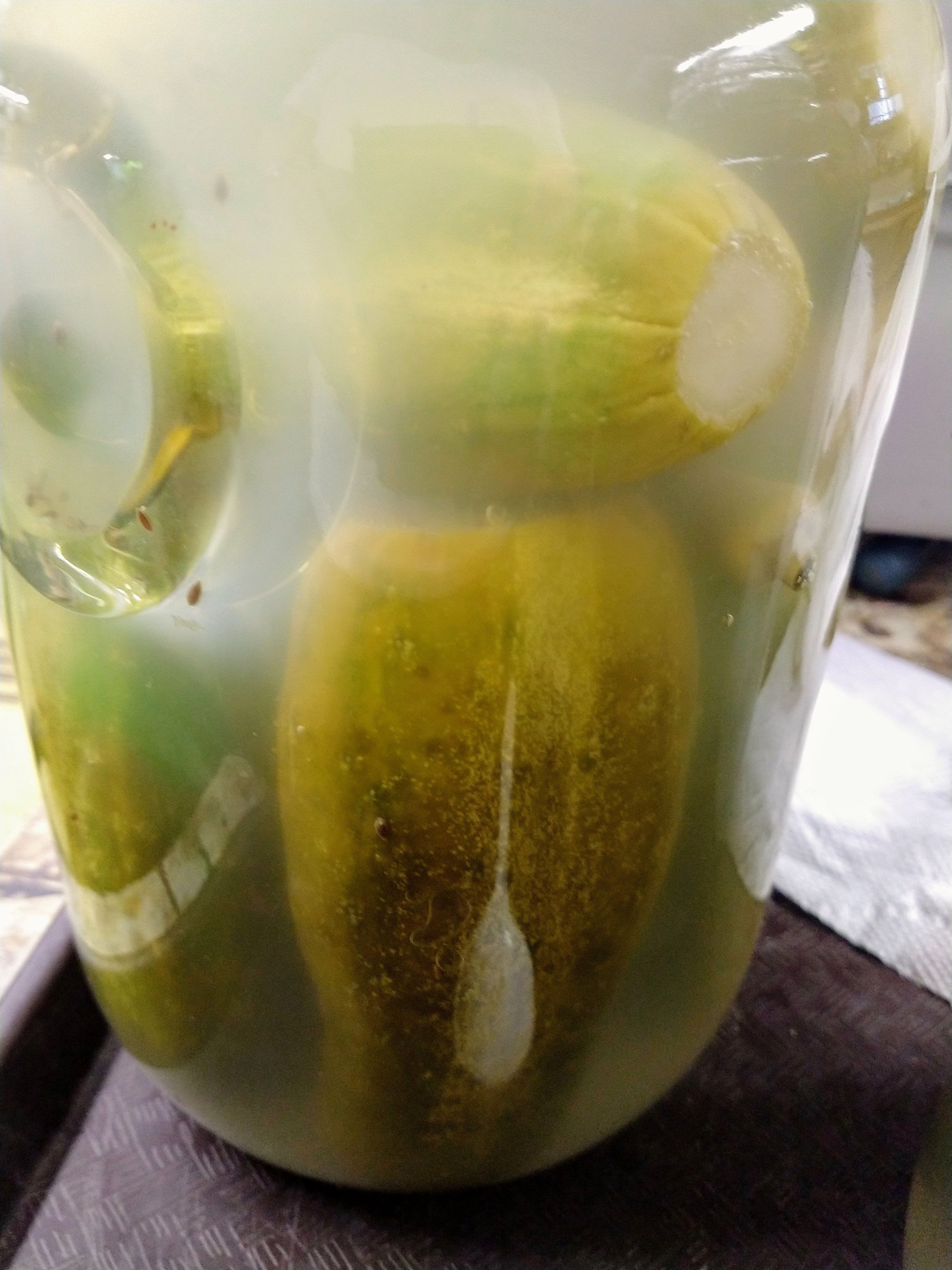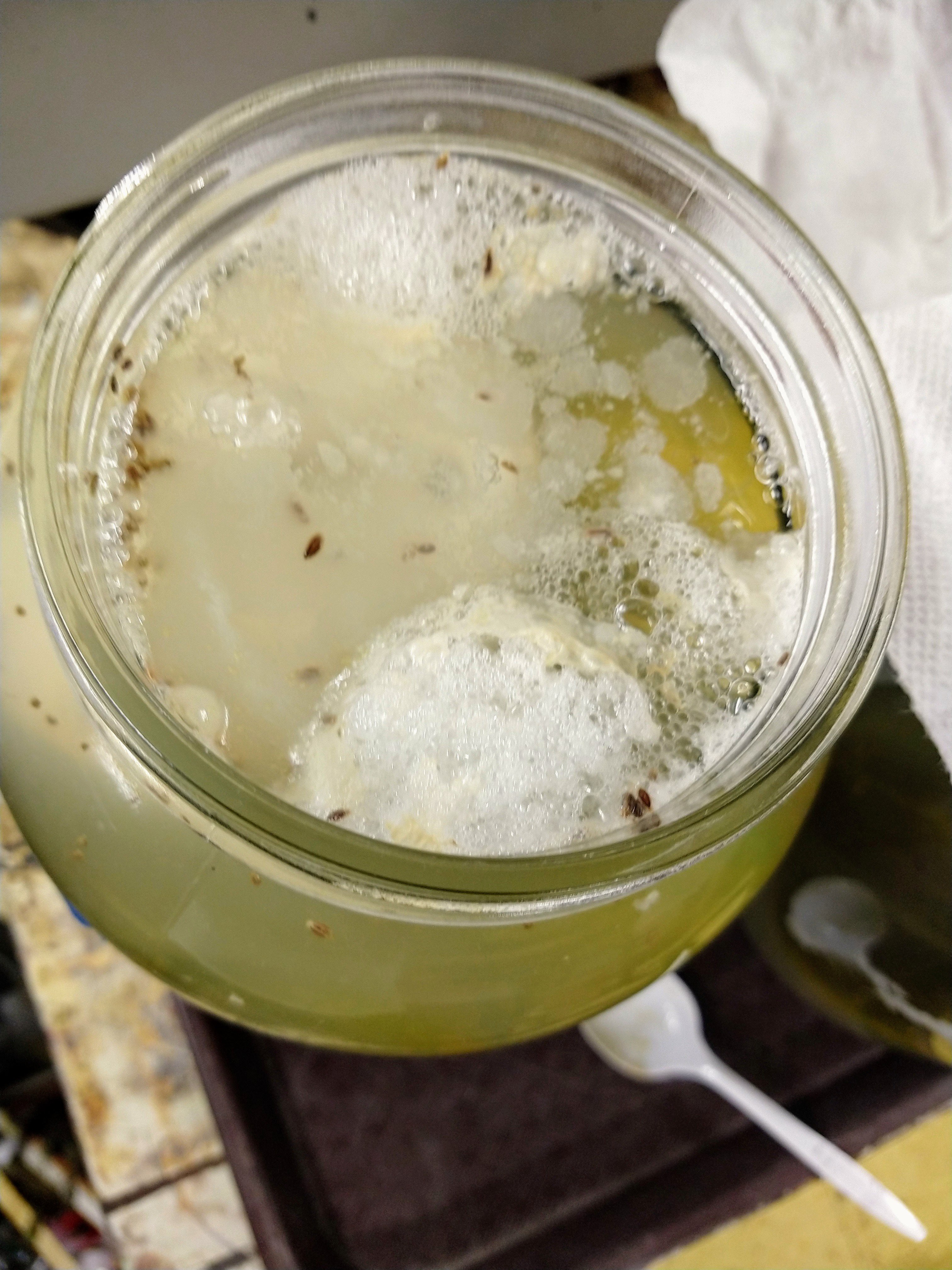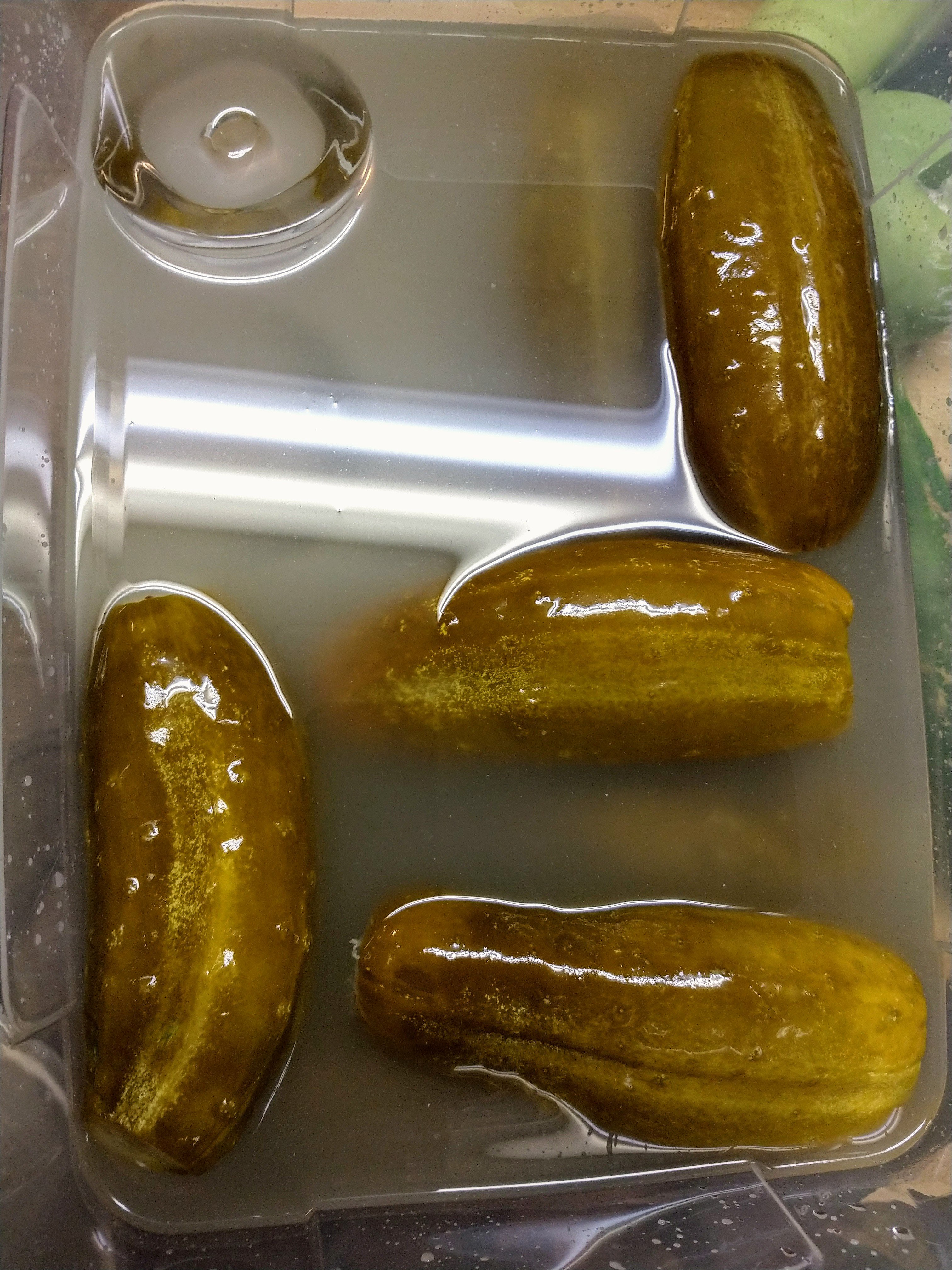Cooking Goddess
Chef Extraordinaire
A quick, no-can pickle, to have on hand in your refrigerator during summer. I've never canned these, so I can't speak to the safety or quality if you do. I suggest you instead use a recipe developed for that type of processing.
This recipe, as given, makes a gallon of pickles. I used this as a base for what ended up being a pickle similar in flavor to what my Dad made. I also make only 1/4 recipe, since I pickle just one quart at a time. I suggest you use this recipe as a base for yourself, then adjust flavors to suit your taste buds. The writer of the article that included this recipe said he is supposed to be on a low-salt diet, so he reduced the salt and increased the vinegar. It resulted in a tastier, crisper pickle. However, for us, we found it to be tooooooo sour.
Ingredients
12 pickling-type cukes, 4-5 inches long, or 7, 6-7 inches long
2 C distilled white vinegar
5 C cold water
2 cloves garlic, crushed or sliced very thin
1/3 C pickling salt
4-6 dill heads, or 2 Tbsp dill seeds
1 gallon ceramic crock/glass vessel
Use fresh, crisp cukes. Wash thoroughly in cold water. (Also wash any fresh dill you may be using.) Six inches is ideal, but if you're using a smaller pickle you can cut the tips off each end so that the brine penetrates the cuke better and prevents the small cukes from going soft. You can split long cukes in half lengthwise so they brine faster.
Use a glass or ceramic container, not metal. If you don't have a 4-quart crock, the insert from a crock pot works fine.
Layer items in crock in this order:
- 2 heads of dill (or a Tbsp) and a crushed or sliced clove of garlic.
- Add a layer(s) of pickles until you're about halfway up the side of the vessel
- Add another 1-2 dill heads and the second clove of garlic
- Put your second layer of cukes, but leave 1 1/2 inches of clearance at the top of the container
- Top with another one or two dill heads, or a bit more dill seed
- Mix water, vinegar, and salt until all the salt is dissolved. Pour over the cukes, making sure they are completely covered
- Top the cukes with a clean plate, making sure the plate is weighed down so that all the cukes are completely submerged. I usually have more liquid than needed, so I put it into the clean jar that will hold the pickles when they are done brining at room temp. If you don't have extra brine, fill a jar with water or use a clean rock.
- Make sure the pickles are submerged the entire time they are curing. If you need more liquid. mix water and vinegar to a 2 to 1 ratio, water to vinegar.
- Cover the crock with a clean kitchen towel. If you think there is any chance that the towel will wick any liquid, make sure the crock and towel are on a safe surface. I learned the hard way to put it on a plastic lap tray...
My Notes:
Because my Dad did it, I put a slice of rye bread on top of the cukes (under the plate) for the first overnight, removing it about 24 hours after I finished packing the crock. Dad said it added to the "sour" of the pickles. I don't argue with his success. Make sure it's a sturdy slice of bread, not a soft sandwich rye. I use the heel part for this. You don't have to use the bread. It's just kinda a family tradition with me.
The recipe says he cures his pickles in his kitchen for 4 days. I put mine crock in the basement and check it every day - it takes about 7-8 days this way.
Once brined enough for your taste, pack the pickles and their brine into a clean jar(s) and refrigerate. If you have a second refrigerator with a lot of room, you can even pour them into a plastic container and put them in that way.
After they are refrigerated, we noticed that they mellowed with flavor. Ideally, I would be making a batch of these every two weeks, not eating the pickles until they had been in the fridge an additional two-week minimum. Practically, I'll be lucky if I make a second batch of pickles this summer.
Enjoy!
This recipe, as given, makes a gallon of pickles. I used this as a base for what ended up being a pickle similar in flavor to what my Dad made. I also make only 1/4 recipe, since I pickle just one quart at a time. I suggest you use this recipe as a base for yourself, then adjust flavors to suit your taste buds. The writer of the article that included this recipe said he is supposed to be on a low-salt diet, so he reduced the salt and increased the vinegar. It resulted in a tastier, crisper pickle. However, for us, we found it to be tooooooo sour.
Ingredients
12 pickling-type cukes, 4-5 inches long, or 7, 6-7 inches long
2 C distilled white vinegar
5 C cold water
2 cloves garlic, crushed or sliced very thin
1/3 C pickling salt
4-6 dill heads, or 2 Tbsp dill seeds
1 gallon ceramic crock/glass vessel
Use fresh, crisp cukes. Wash thoroughly in cold water. (Also wash any fresh dill you may be using.) Six inches is ideal, but if you're using a smaller pickle you can cut the tips off each end so that the brine penetrates the cuke better and prevents the small cukes from going soft. You can split long cukes in half lengthwise so they brine faster.
Use a glass or ceramic container, not metal. If you don't have a 4-quart crock, the insert from a crock pot works fine.
Layer items in crock in this order:
- 2 heads of dill (or a Tbsp) and a crushed or sliced clove of garlic.
- Add a layer(s) of pickles until you're about halfway up the side of the vessel
- Add another 1-2 dill heads and the second clove of garlic
- Put your second layer of cukes, but leave 1 1/2 inches of clearance at the top of the container
- Top with another one or two dill heads, or a bit more dill seed
- Mix water, vinegar, and salt until all the salt is dissolved. Pour over the cukes, making sure they are completely covered
- Top the cukes with a clean plate, making sure the plate is weighed down so that all the cukes are completely submerged. I usually have more liquid than needed, so I put it into the clean jar that will hold the pickles when they are done brining at room temp. If you don't have extra brine, fill a jar with water or use a clean rock.
- Make sure the pickles are submerged the entire time they are curing. If you need more liquid. mix water and vinegar to a 2 to 1 ratio, water to vinegar.
- Cover the crock with a clean kitchen towel. If you think there is any chance that the towel will wick any liquid, make sure the crock and towel are on a safe surface. I learned the hard way to put it on a plastic lap tray...
My Notes:
Because my Dad did it, I put a slice of rye bread on top of the cukes (under the plate) for the first overnight, removing it about 24 hours after I finished packing the crock. Dad said it added to the "sour" of the pickles. I don't argue with his success. Make sure it's a sturdy slice of bread, not a soft sandwich rye. I use the heel part for this. You don't have to use the bread. It's just kinda a family tradition with me.

The recipe says he cures his pickles in his kitchen for 4 days. I put mine crock in the basement and check it every day - it takes about 7-8 days this way.
Once brined enough for your taste, pack the pickles and their brine into a clean jar(s) and refrigerate. If you have a second refrigerator with a lot of room, you can even pour them into a plastic container and put them in that way.
After they are refrigerated, we noticed that they mellowed with flavor. Ideally, I would be making a batch of these every two weeks, not eating the pickles until they had been in the fridge an additional two-week minimum. Practically, I'll be lucky if I make a second batch of pickles this summer.
Enjoy!



